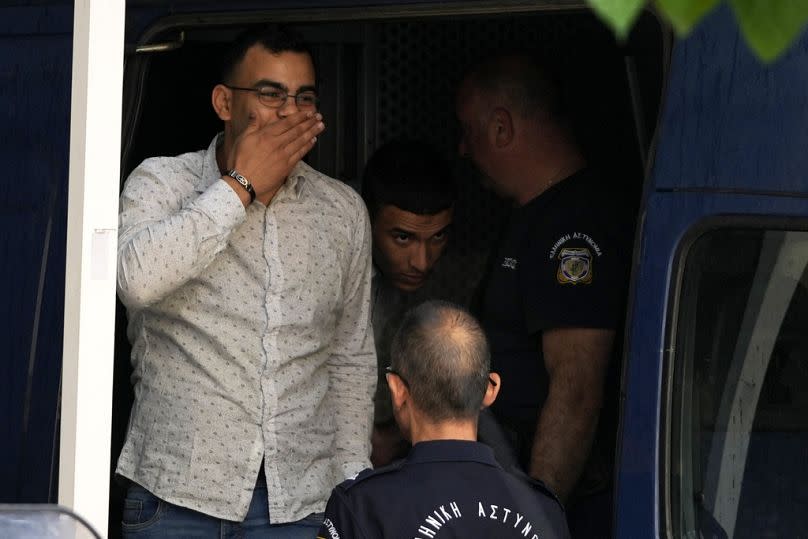Greek judge dismisses Adriana shipwreck case, claiming no jurisdiction

A Greek judge dismissed a case Tuesday against nine Egyptian men accused of causing a shipwreck that killed hundreds of migrants last year and sent shockwaves through the European Union’s border protection and asylum operations after a prosecutor told the court Greece lacked jurisdiction.
The decision by Presiding Judge Eftichia Kontaratou came shortly after the trial opened in the southern Greek city of Kalamata and was greeted with cheers and applause from supporters of the defendants at the courthouse.
The judge's ruling followed a recommendation by public prosecutor Ekaterini Tsironi for the case to be dismissed because the trawler sank outside Greek territorial waters.
“The shipwreck clearly occurred in international waters and … the jurisdiction of the Greek courts cannot be established," she said. "I propose that they be declared innocent.”
Rescue attempt gone awry?
The men who were due to go on trial were accused of causing the worst migrant shipwreck in the Mediterranean Sea in ten years.
Human rights groups, including Amnesty International and Human Rights Watch, said the men should not be used as a scapegoat before an investigation is concluded as to whether the Greek Coast Guard botched the rescue attempt.
The defendants, aged between 20 and 41, were facing up to life in prison if convicted on multiple criminal charges over the sinking of the Adriana fishing trawler on 14 June last year. All had categorically denied being involved in a smuggling operation.
More than 500 people are believed to have gone down with the fishing trawler, which had been travelling from Libya to Italy. Following the sinking, 104 people were rescued — mostly migrants from Syria, Pakistan and Egypt — and 82 bodies were recovered. The incident was a blow to the EU's border protection and asylum operations.

The Greek Coast Guard has consistently denied any wrongdoing in the disaster. Government officials insist the authorities were unable to take any earlier action because the trawler was in international waters at the time.
Seven boats carrying more than 400 migrants arrive in Canary Islands
Ireland struggles to deal with migrant influx across UK border
Authorities also claim the boat was travelling for at least seven hours before the sinking happened but it did not attempt a rescue because the boat did not appear to be in danger.
A separate investigation into the conduct of the Coast Guard is currently underway.
'Guilty on incomplete evidence'
Maritime officials have also had to fend off consistent accusations that they deliberately failed to intervene because they feared bringing such a large number of migrants ashore.
But survivors and those representing them dispute this version of events. A report released in December by the EU border agency Frontex, which spotted the boat first before the coast guard from the air, also alluded to dereliction of duty. Evidence collected by the agency says Greek authorities failed to reply to calls for assistance.
Survivors also argue the Hellenic authorities' fatal attempt to tow the trawler actually caused the boat to sink.
“There’s a real risk that these nine survivors could be found guilty on the basis of incomplete and questionable evidence given that the official investigation into the role of the Coast Guard has not yet been completed,” Judith Sunderland, Associate Europe and Central Asia Director at Human Rights Watch said in a press release last Friday.
“Credible and meaningful accountability for one of the worst shipwrecks in the Mediterranean needs to include a determination of any liabilities of Greek authorities.”
Protesting Greeks show their anger at unemployment and low wages
Italy, Slovenia, Greece: Which European countries are most impacted by flooding as climate heats up?
But, authorities say the defendants were identified by other survivors and the indictments are based on their testimonies.
Frontex says illegal border detections at EU frontiers increased for three consecutive years through 2023, reaching the highest level since the 2015-2016 migration crisis — driven largely by arrivals at the sea borders.

